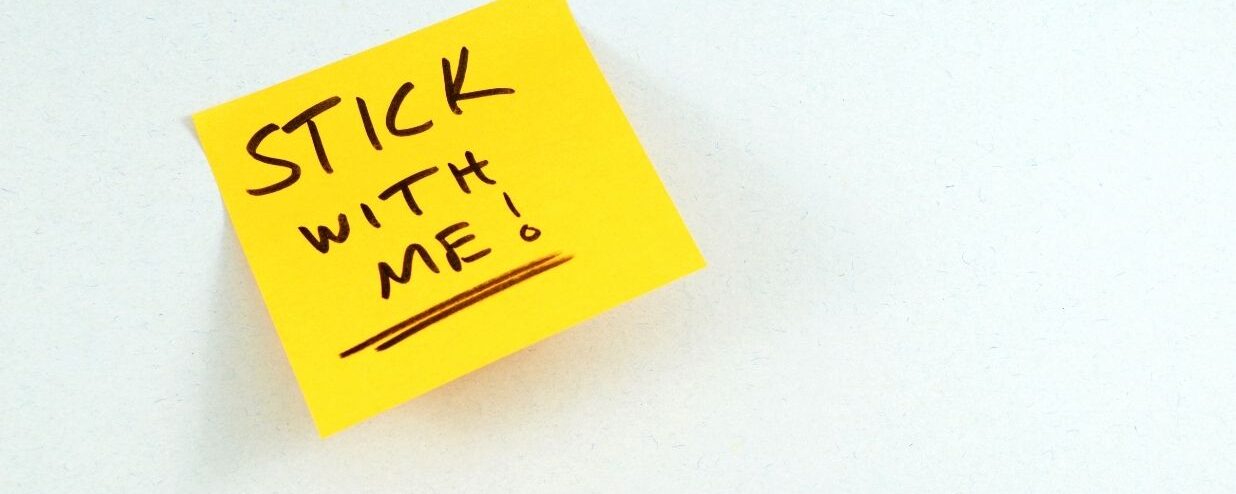Ever heard someone say, “Miso love you!” and get a laugh? Welcome to the world of dajare, or Japanese puns, that play on similar sounds and clever word twists. While these jokes are often groan-worthy, they are embedded in Japanese pop culture, daily conversations, and even advertising.
If you love learning about Japanese wordplay, or kotoba asobi, you’ll love to hear some of the most popular puns. Whether you are just starting out or looking to level up your language game with some laughter, this guide introduces 20 of the most iconic Japanese puns to know!
What is Dajare?
The word 駄洒落 (dajare) refers to a kind of pun or joke that is based on wordplay. Think of it as a Japanese dad joke. Dajare can be found everywhere in Japan, from advertisements to variety shows and even children’s books. They are often delivered with a smirk or a dramatic pause.
Types of Japanese Puns
Of course, not all Japanese puns are created equal, much like the English equivalent. Check out a few common types of dajare before we dive right into some funny examples!
1. Homophones
Most probably, the most common types of puns, homophones, and multiple-meaning puns are jokes that use words that sound the same but have different meanings.
For example, the word かみ (kami) can mean “hair”, “paper”,or even “god” at the same time!
2. Similar sound and phrase substitution puns
Ever heard of Near-homophones or intentional substitutions that make a sentence funny or expected?
For example, the word すき (like) and スキー (ski) sound similar when you say them fast enough!
3. Kanji and visual wordplay
Sometimes dajare depend on kanji that look or sound alike, or even combine characters to form a joke.
Using our example before, the kanji for かみ (kami) can be written as 神 (god) vs 紙 (paper)
4. Onomatopoeic and sound symbolism puns
Japan is rich with sound-based words like ぴかぴか (sparkling). These are twisted for a funny effect.
Check out some funny Japanese onomatopoeia to know!
20 Funny Japanese Puns to Know
1. 布団が吹っ飛んだ
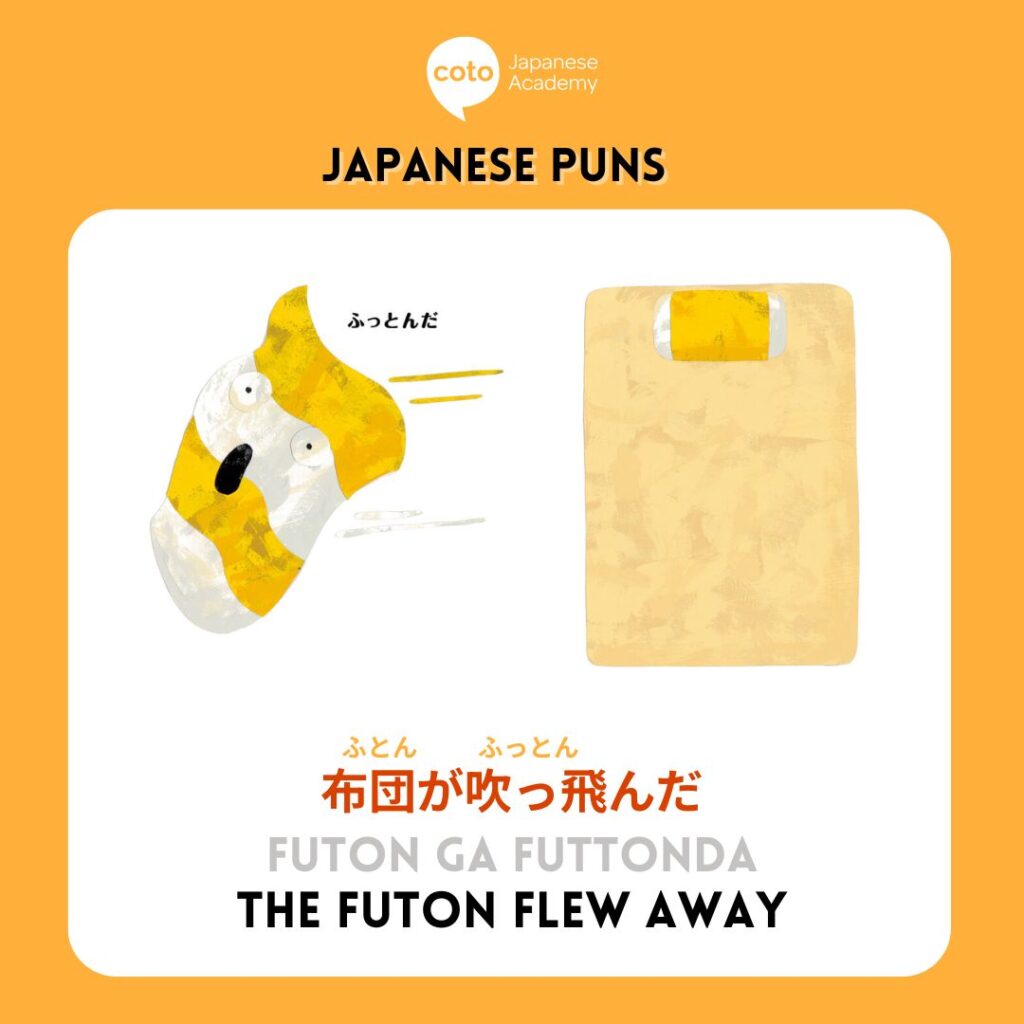
Romaji: Futon ga futtonda
Meaning: The futon flew away
Wordplay: Futon (futon) + futtonda (blew away).
Explanation: This is probably one of the most iconic Japanese puns. It plays on the sound similarity between futon and futtonda, creating a rhythmic, rhyming phrase. It is funny, not because of the deep meaning, but because of the satisfying alliteration. Kids learn this early on, and it is often used in comedy routines.
2. Arumikan no ue ni aru mikan (アルミ缶の上にあるミカン)
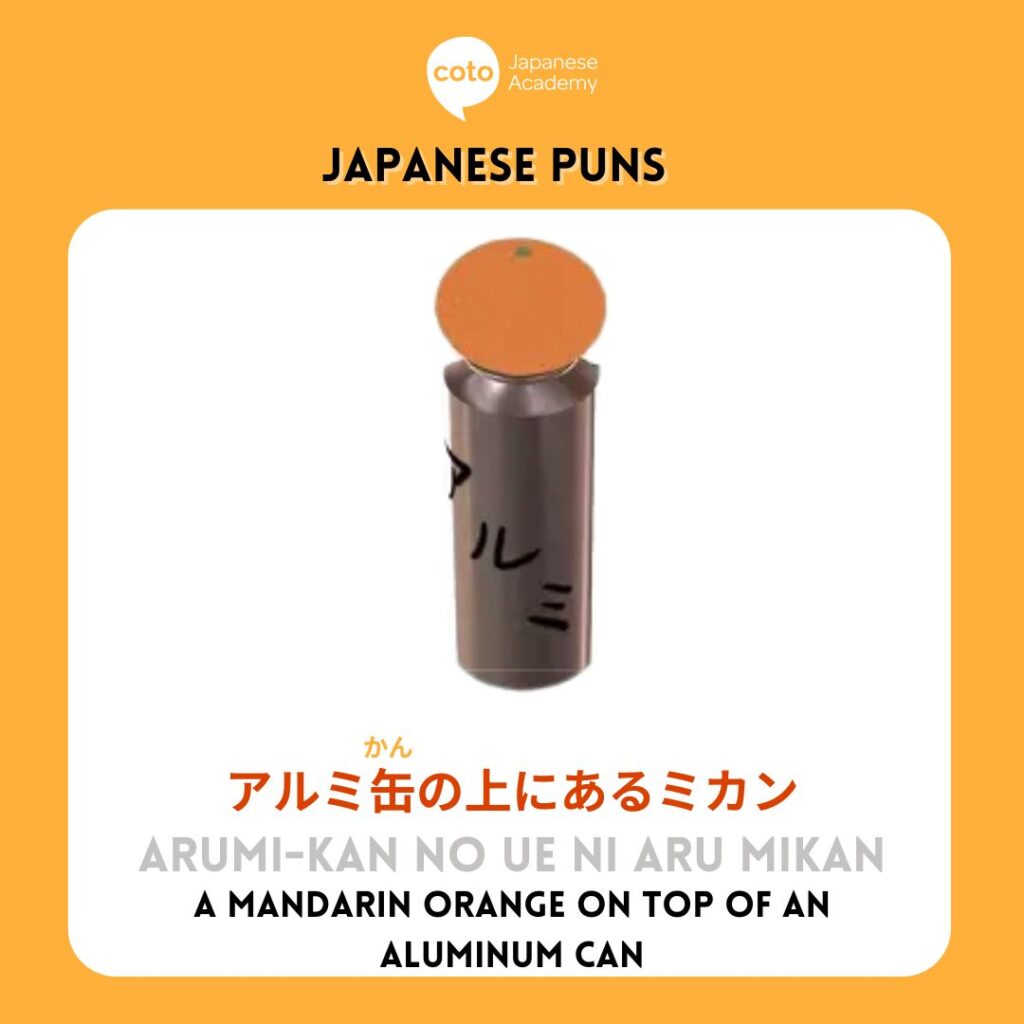
Romaji: Arumi-kan no ue ni aru mikan
Meaning: A mikan on top of an aluminum can.
Wordplay: Arumi-kan (aluminum can) + aru mikan (there’s a mikan)
Explanation: This pun is more visual when written out. It sounds like a Japanese tongue twister, and it uses a classic structure by breaking up compound words into separate words. While the sentence is perfectly grammatical, the absurdity of putting a mikan on a can is what makes it fun.
3. Ika ga ii ka? (イカがいいか?)
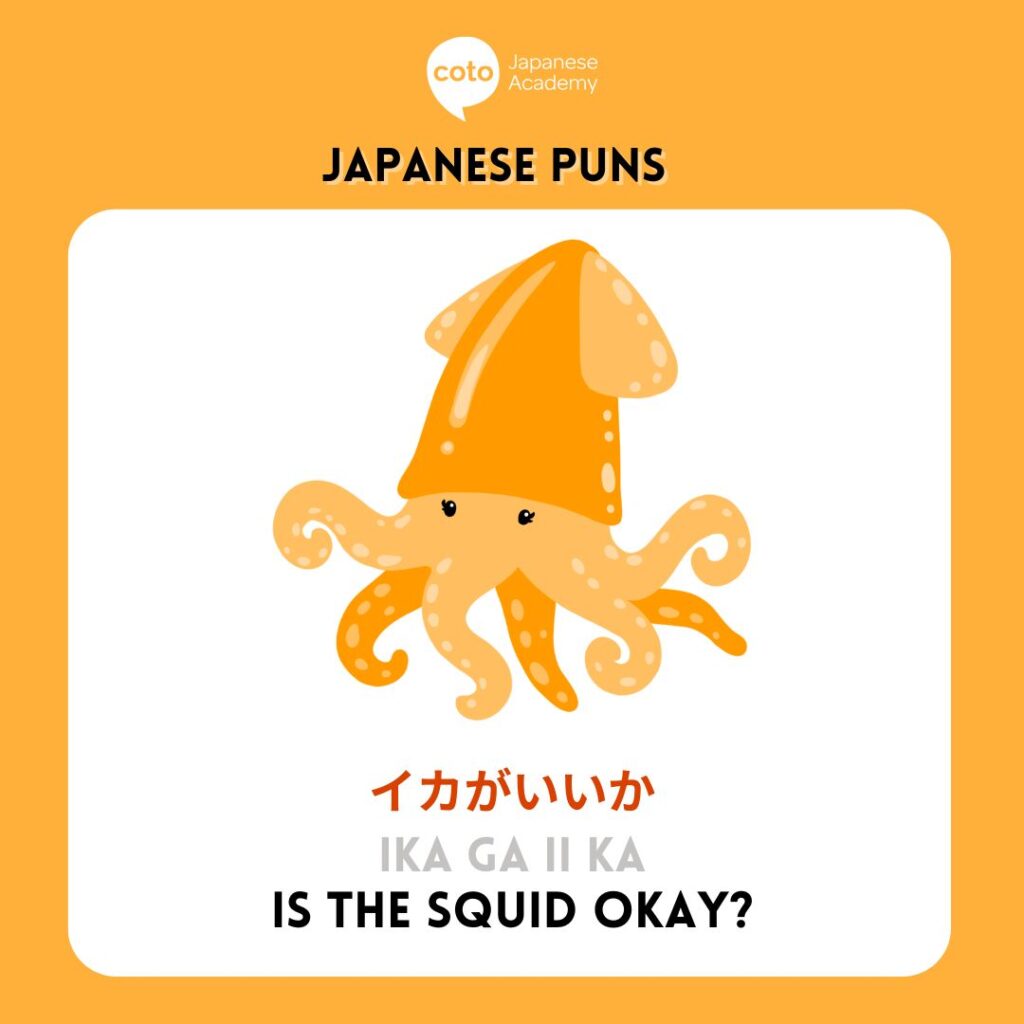
Romaji: Ika ga ii ka?
Meaning: Is squid okay?
Wordplay: Ika (squid) + ii ka (is it okay?)
Explanation: The joke relies on how ii ka flows naturally after ika. It is the kind of question you would hear at a sushi restaurant, but it sounds so funny when you realize you are asking “Is squid good?” and saying “squid is good?” in the same exact breath. This is a Japanese pun that doubles as a useful phrase.
4. Sukii wa suki (スキーは好き)
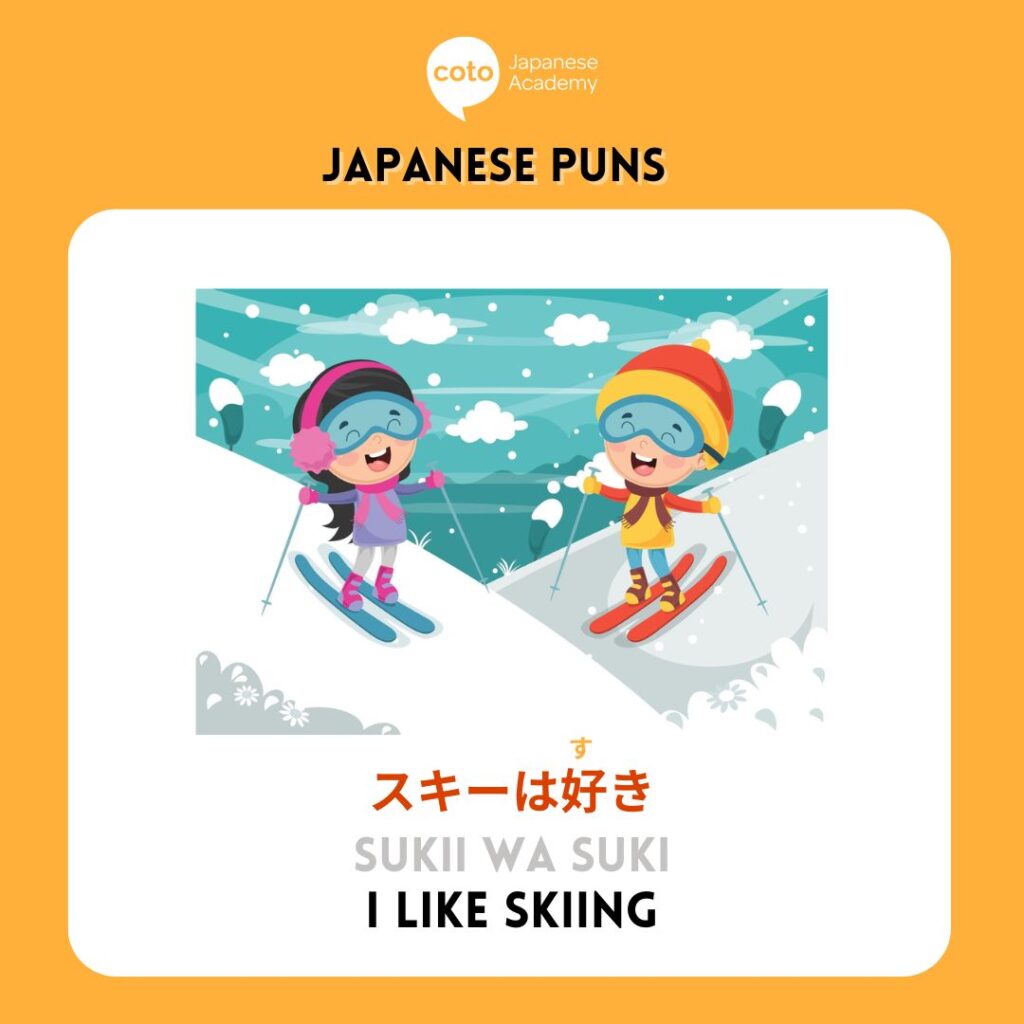
Romaji: Sukii wa suki
Meaning: I like skiing.
Wordplay: Suki (like) + sukii (ski)
Explanation: This dajare is straightforward and super useful for learners. You are saying you like skiing, but because suki and sukii sound so close, it creates a mini echo. This is also a common line used in various Japanese shows or textbook jokes.
5. Kaeru ga kaeru (カエルが帰る)
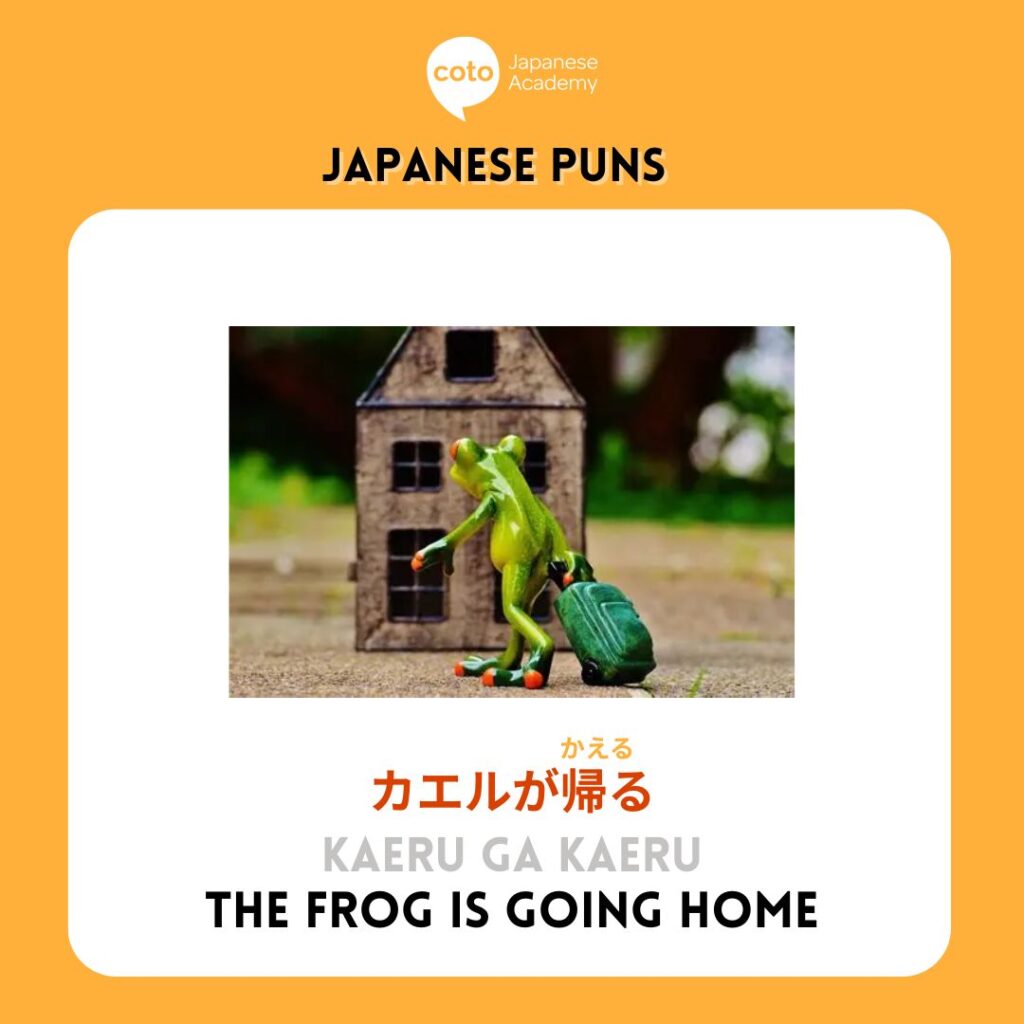
Romaji: Kaeru ga kaeru
Meaning: The frog is going home.
Wordplay: Kaeru (frog) + kaeru (to return)
Explanation: Here, the humor comes from kaeru, which can mean both “frog” and the Japanese verb “return” depending on the kanji used. It is a favorite among children and language learners because it demonstrates how Japanese homophones work and makes vocabulary learning fun.
6. Toire ni itto ire (トイレに行っといれ)
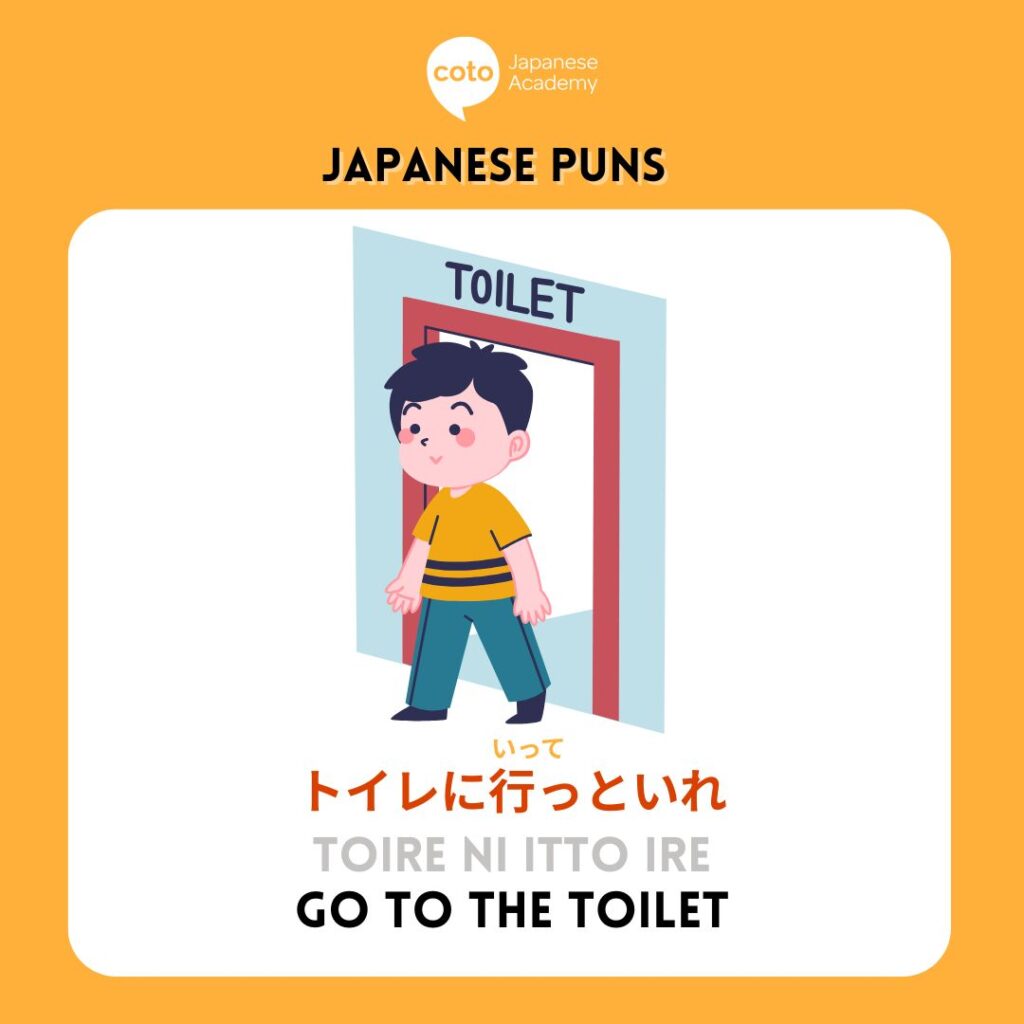
Romaji: Toire ni itto ire
Meaning: Go to the toilet.
Wordplay: Toire (toilet) + itto ire (go and come back – Kansai dialect)
Explanation: This pun is especially fun because it uses a Kansai dialect twist. It blends toire (toilet) with itto ire, a way of saying “go and come back.” It is almost like saying, “Go to the toilet and return.” The phrase mimics everyday language but swaps the expected ending for a sound-alike.
7. Sanda ga chitta (サンタが散った)
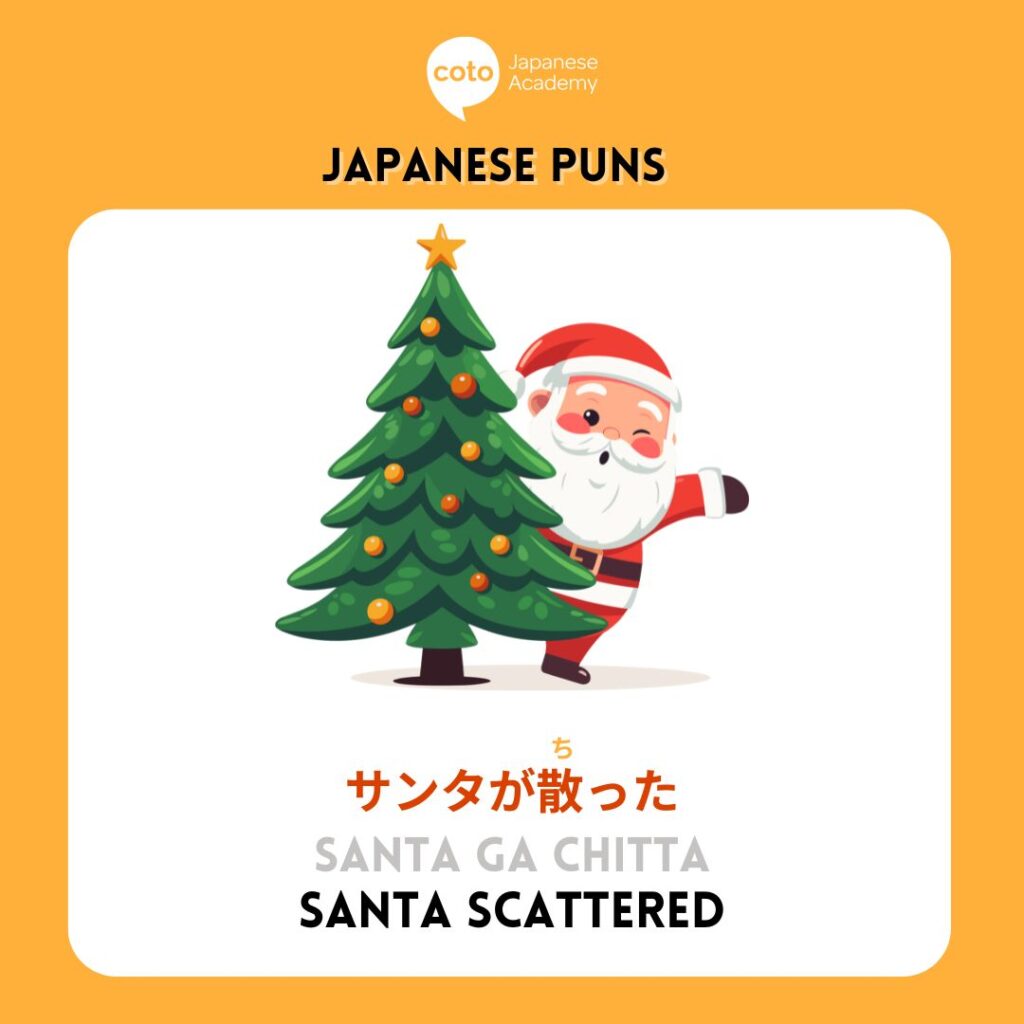
Romaji: Santa ga chitta
Meaning: Santa scattered.
Wordplay: Santa + chitta (cattered/fell apart)
Explanation: This pun has a dark humor twist. Santa is just Santa Claus, and chitta means “scattered” or “broken apart.” It sounds like the poor Santa Claus exploded into pieces, giving an oddly funny image. The unexpected violence in such a cheerful context is what makes it hilarious in Japanese comedy shows or manga with dramatically exaggerated reactions.
8. Kami ga kaminarimashita (雷がカミナリました)
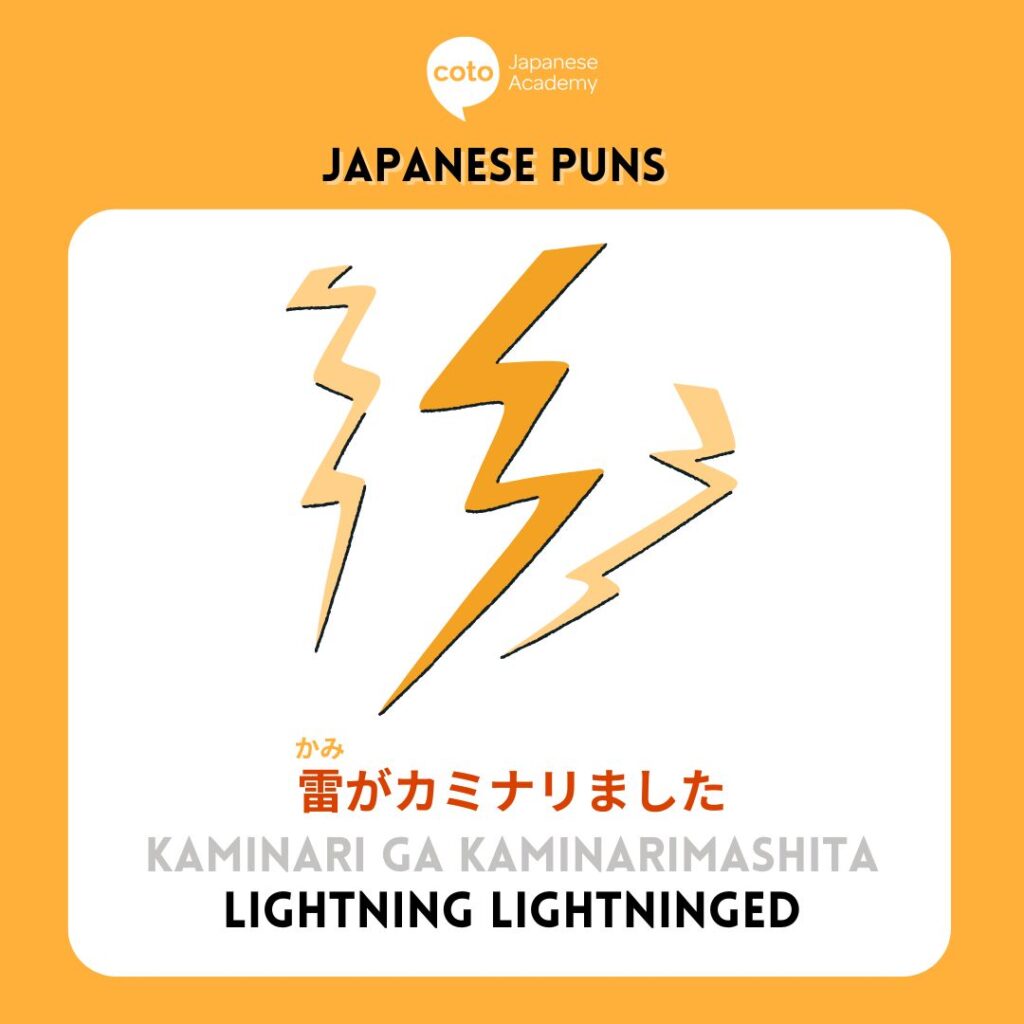
Romaji: Kaminari ga kaminarimashita
Meaning: Lightning struck.
Wordplay: Kaminari (lightning) + nari mashita (happened)
Explanation: This joke uses kaminari (lightning) and turns it into a pseudo-verb kaminarimashita, which is a made-up version of “it lightning-ed”. Even though kaminari is not actually a verb, the sentence still feels grammatically correct, which makes it funny. It is a classic example of how dajare can bend grammar rules to create humor.
9. Kani ga kansha (カニに感謝)
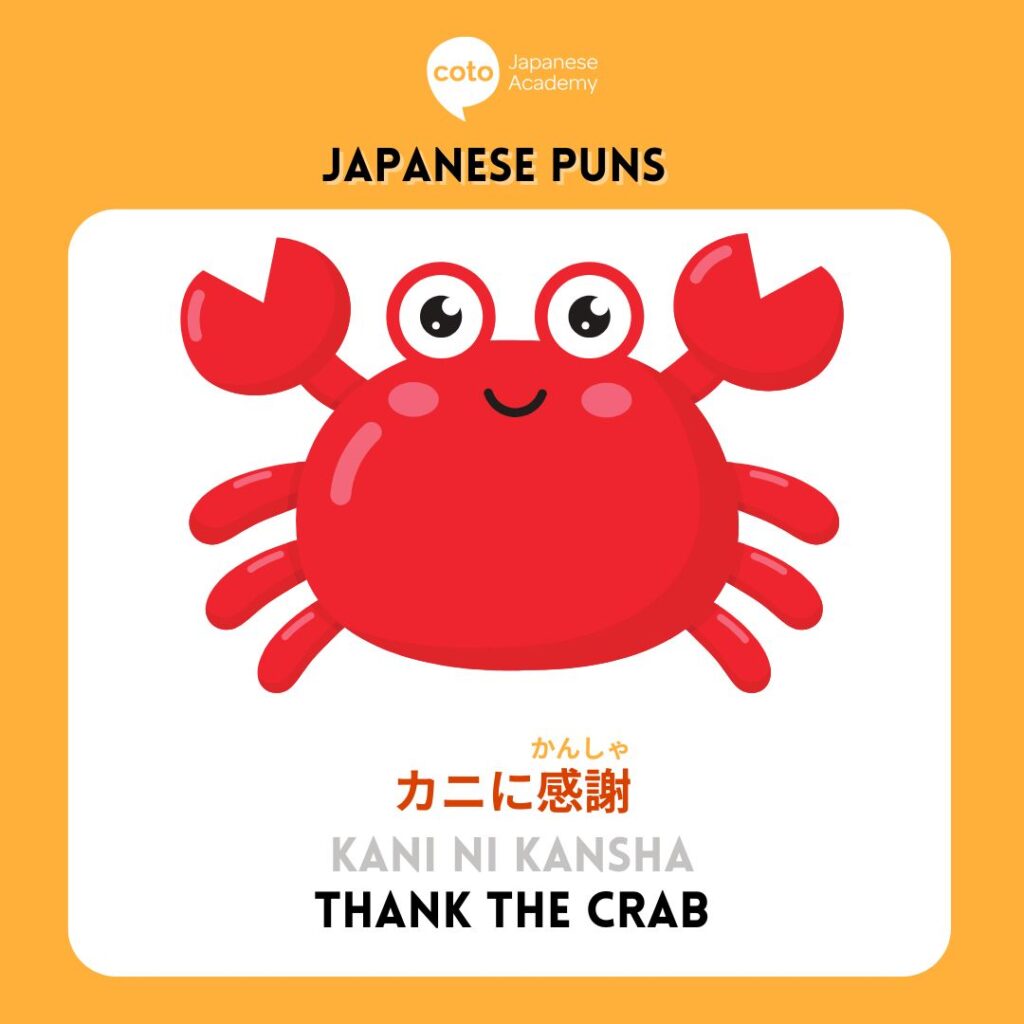
Romaji: Kani ni kansha
Meaning: Thanks to the crab.
Wordplay: Kani (crab) + kansha (gratitude)
Explanation: This pun rhymes kani (crab) with kansha (gratitude). The sentence literally means “I am thankful to the crab,” which sounds a bit absurd but polite. You might imagine someone bowing to a crab on a dinner plate, saying “Kani ni kansha.” It’s a polite pun that could be used in food-related contexts.
10. Ikura wa ikura? (いくらはいくら?)
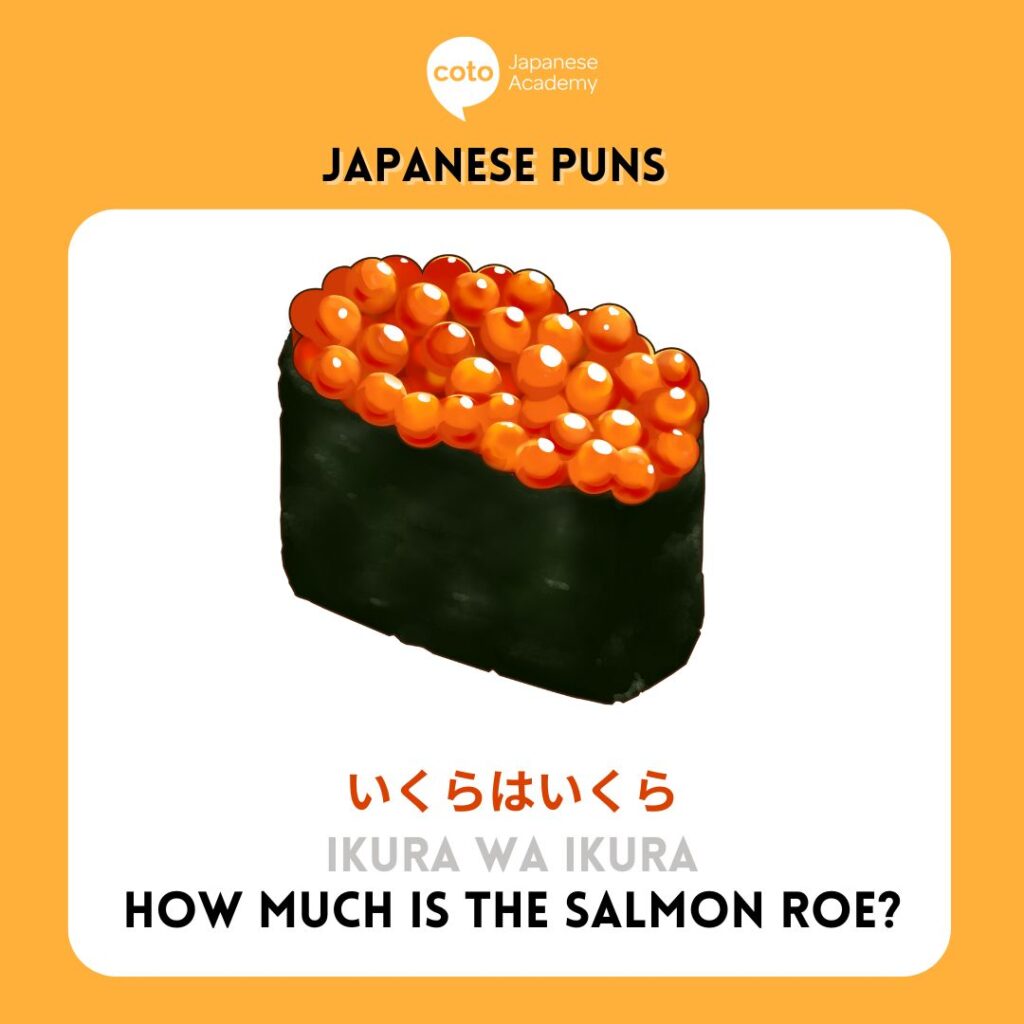
Romaji: Ikura wa ikura?
Meaning: How much is the salmon roe?
Wordplay: Ikura (salmon roe) + ikura (how much)
Explanation: Ikura can mean both “salmon roe” (a sushi topping) and “how much.” The full sentence is an actual question you might ask at a sushi restaurant: “How much is the ikura?” The double meaning makes it comedic because you repeat the same sound with different meanings.
11. Neko wa nekoronda (ねこはネコロンダ)
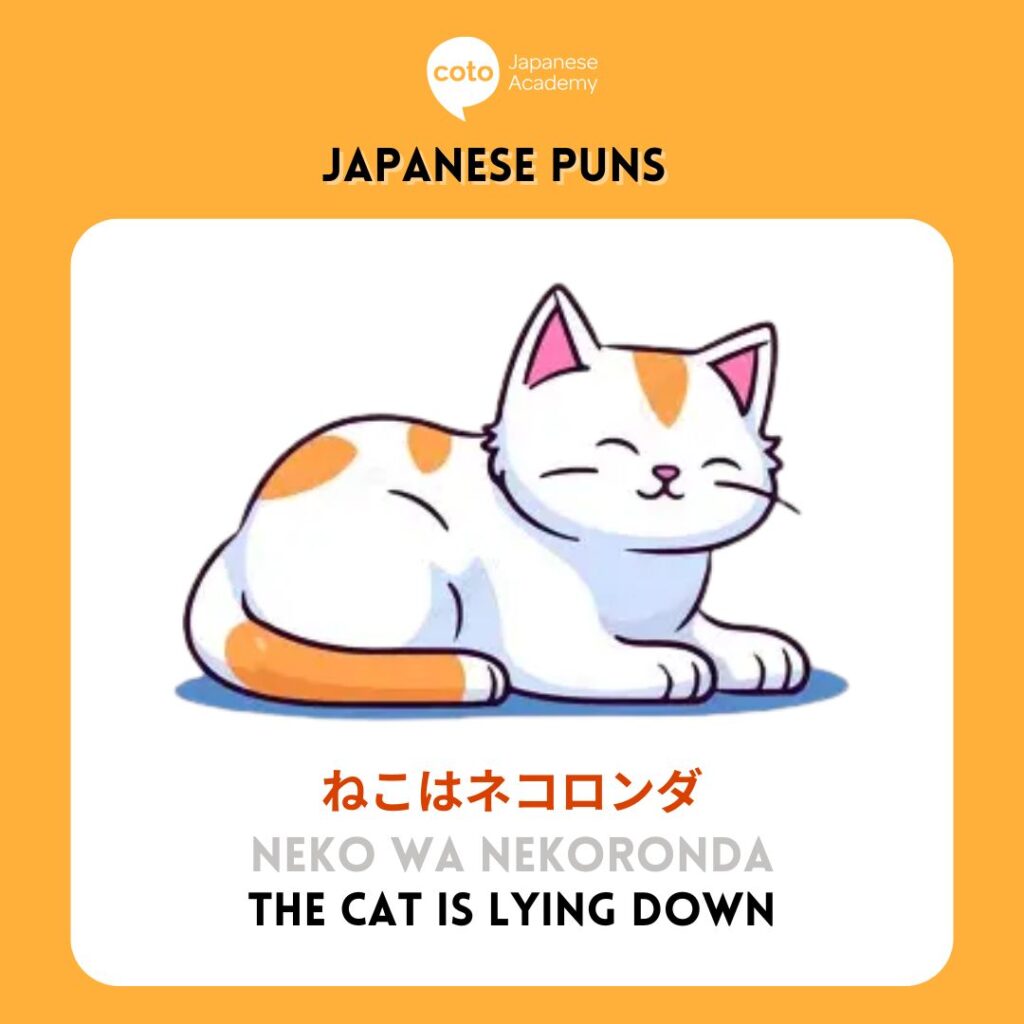
Romaji: Neko wa nekoronda
Meaning: The cat is lying down
Wordplay: Neko (cat) + nekoronda (to lie down)
Explanation: This pun uses the word neko, meaning “cat,” and nekoronda, meaning “laid down.” It sounds like you are repeating “neko” in a fun way — neko wa nekoronda, making it catchy and rhythmic. This one is light and silly, used mostly in kids’ books or nursery rhymes, and it plays with both vocabulary and sound to create a funny mental image: a lazy cat flopped over, doing what cats do best. It is also a great one for learners to practice pronunciation and see how word roots repeat in Japanese verbs.
12. Hae ga haee (ハエがはえー)
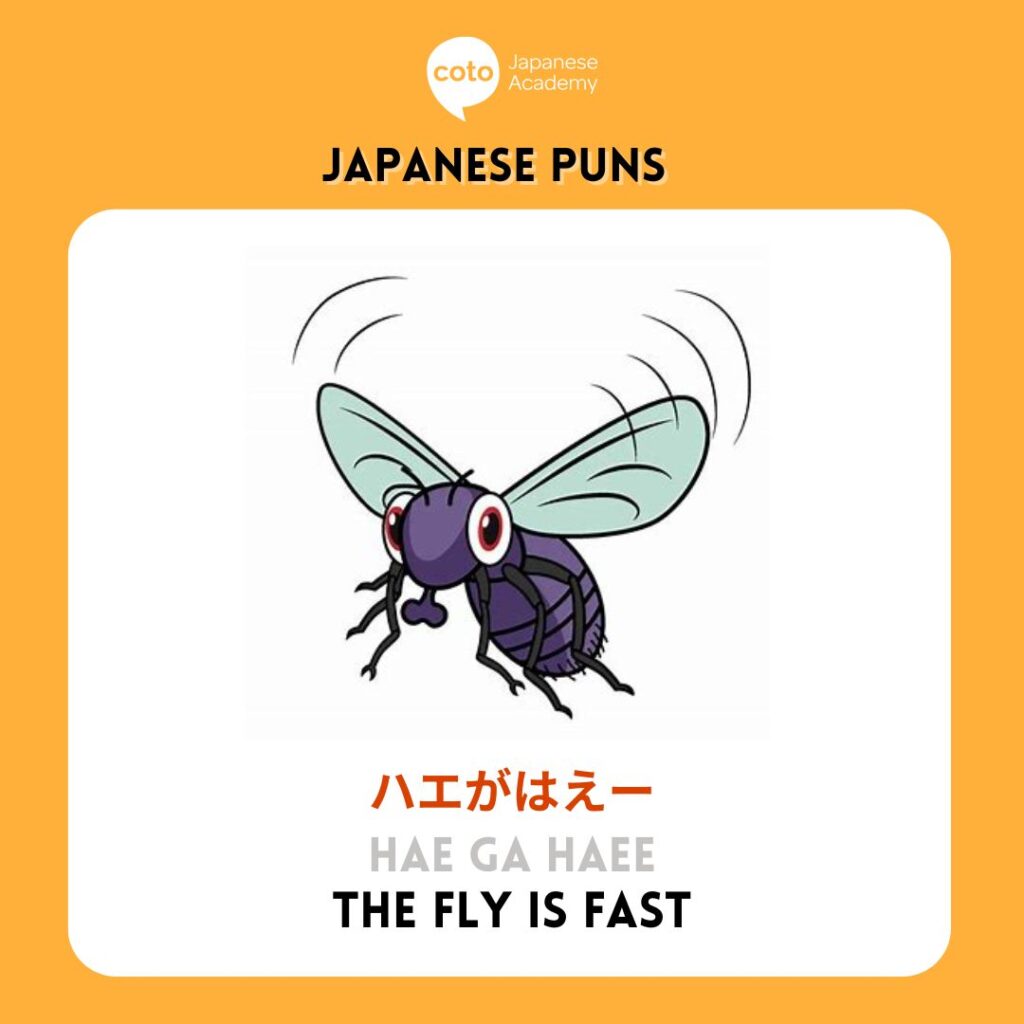
Romaji: Hae ga haee
Meaning: The fly is fast!
Wordplay: Hae (fly) + hayai (fast) pronounced haē
Explanation: Hae means “fly” and haee is a casual pronunciation of the Japanese adjective hayai (fast). The phrase sounds like a complaint someone might make after being scared off by a buzzing fly. The humor lies in how natural yet goofy the line sounds, especially when said quickly.
13. Tou-san ga tousan shita (父さんが倒産した)
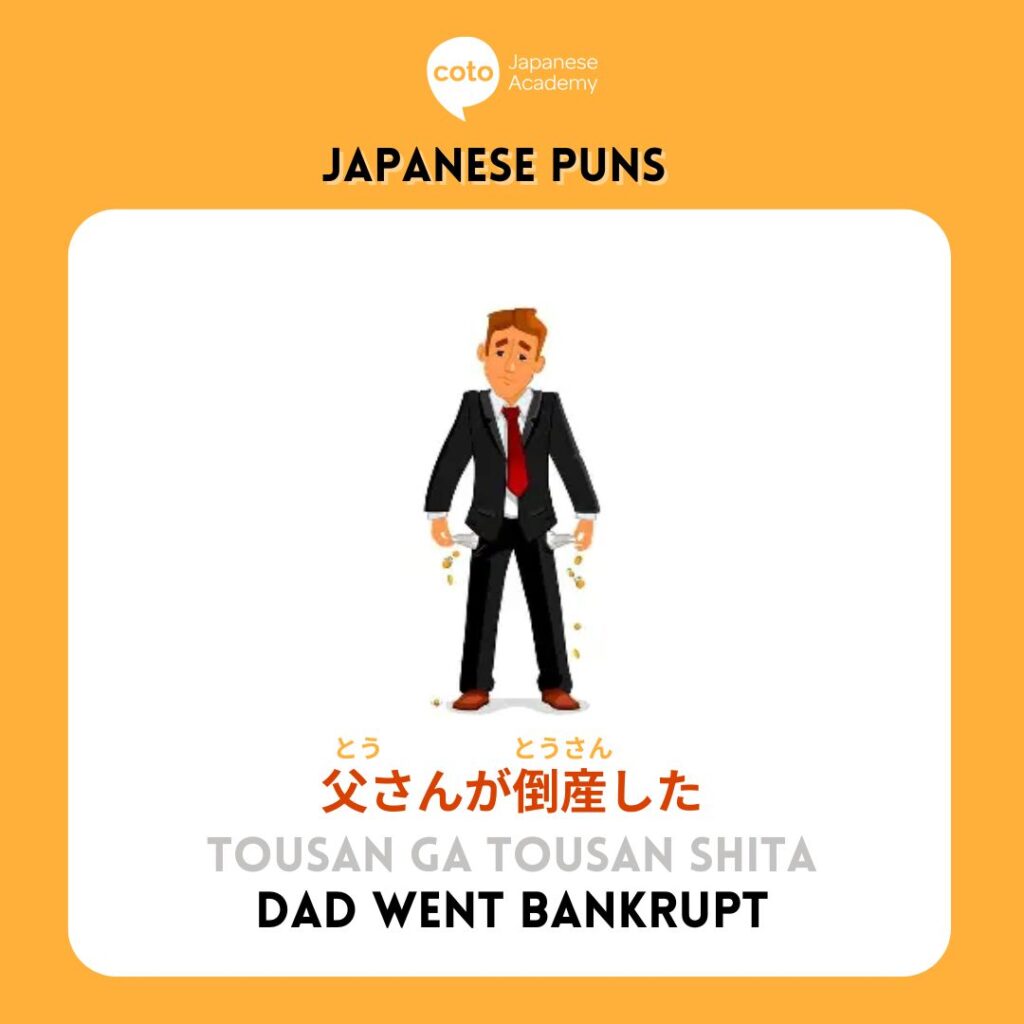
Romaji: Tousan ga tousan shita
Meaning: Dad went bankrupt.
Wordplay: Tousan (father) + tousan (bankruptcy)
Explanation: In this pun, tousan can mean both “bankruptcy” and “dad”, depending on context. The phrase goes from serious to sympathetic, which adds emotional depth. It shows how dajare can combine both humor and real-world situations.
14. Tousa, katsura katta ka na? (父さん、カツラ買ったかな?)

Romaji: Tousan, katsura katta ka na?
Meaning: Did Dad buy a wig?
Wordplay: Katsura (wig)
Explanation: This joke involves tou-san (dad) and katsura (wig). It is funny because it is phrased like a serious question, but ends on a silly note with imagining your dad secretly buying a wig. It is great for playing with everyday vocabulary as well as poking fun at family.
15. Ana o hooru (穴をホール)
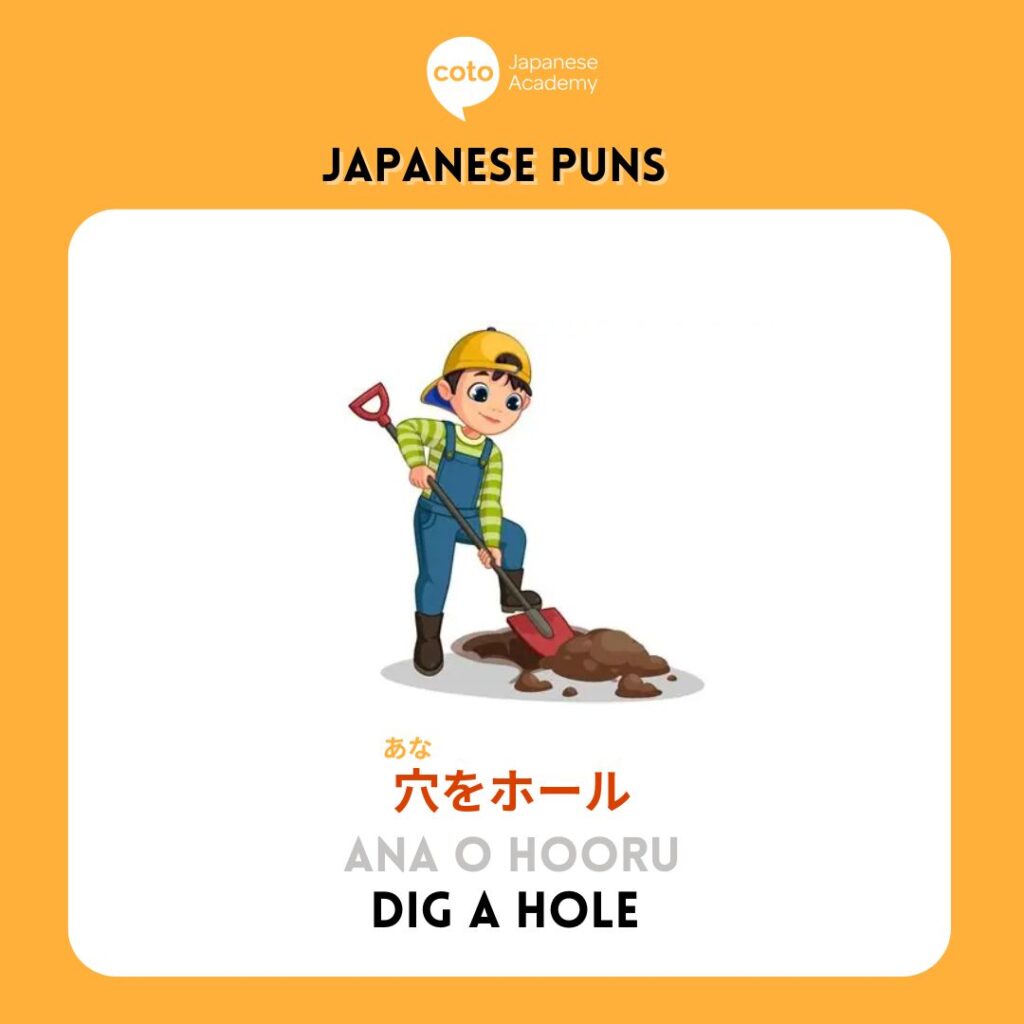
Romaji: Ana o hooru
Meaning: Dig a hole.
Wordplay: Ana (hole) + hooru (hole)
Explanation: The sentence literally means “Dig a hole,” but it sounds like you are saying, “Hole a hole.” In Japanese, ana is the native word for “hole,” and hooru is a katakana loanword from English with the same meaning. The joke is subtle and plays on bilingual wordplay with a double “hole” that does not sound like much in English, but in Japanese, it is a cute and silly joke that is guaranteed to get some laughs.
16. Kono okashi, okashii (このお菓子、おかしい)
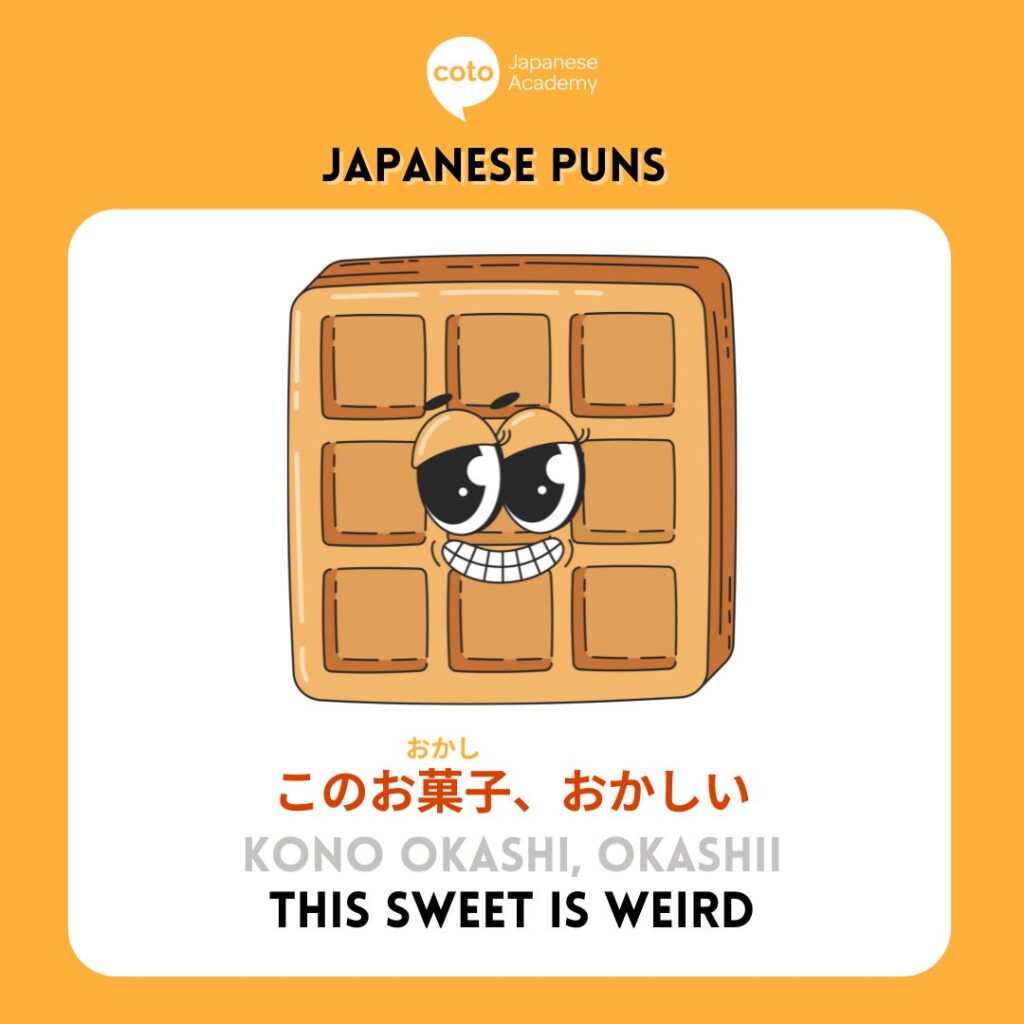
Romaji: Kono okashi, okashii
Meaning: This sweet is weird.
Wordplay: Okashi (sweets) + okashii (weird)
Explanation: This dajare can be used as both a critique of a dessert and a punny observation. It is often used when trying unusual Japanese snacks and giving a review. The pun is perfect for describing things such as wasabi Kit Kats or squid ice cream.
16. Megane ga nai to, me ga ne (ガネがないと、目がね…)
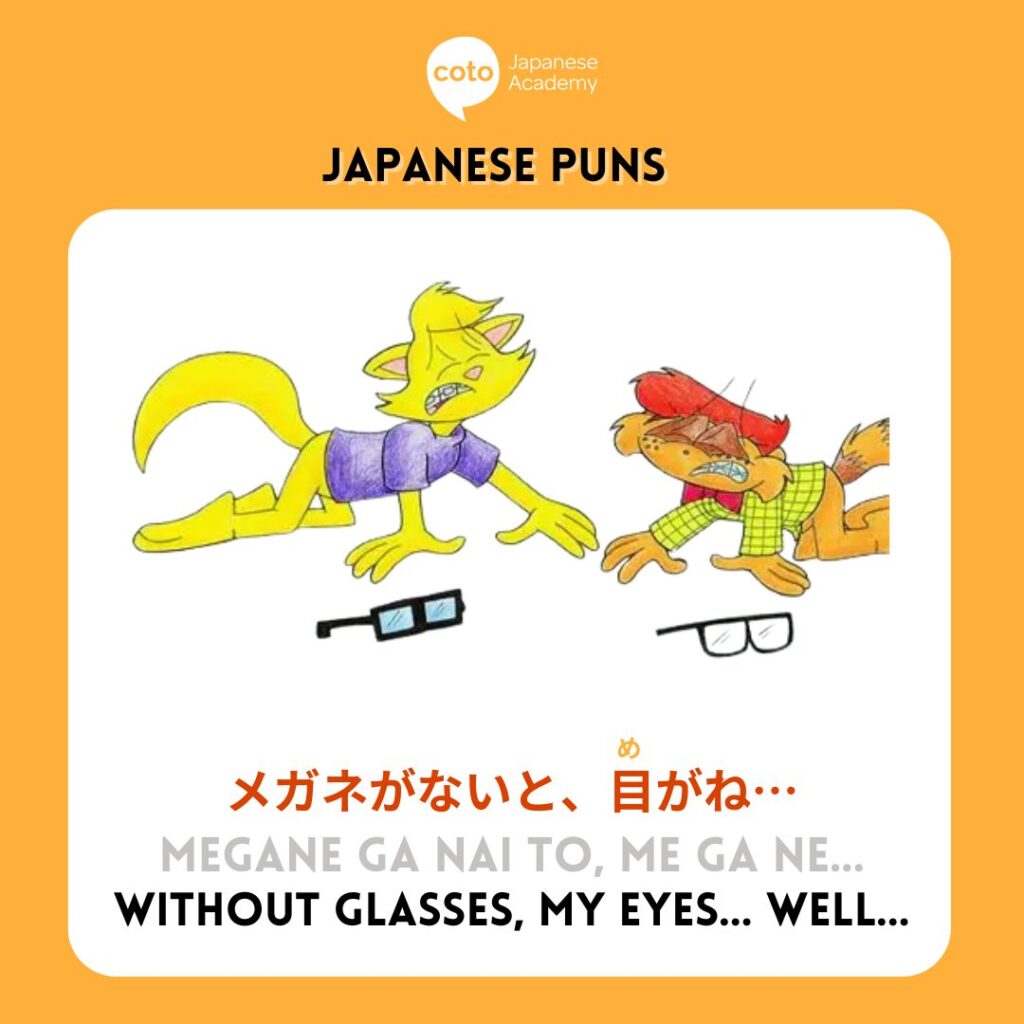
Romaji: Megane ga nai to, me ga ne
Meaning: Without glasses, my eyes… well…
Wordplay: Megane (glasses) + me ga ne… (my eyes are…)
Explanation: Megane means “glasses,” and me ga ne… could be interpreted as “my eyes are…” trailing off. The pun is both visual and verbal, and the ellipsis adds a dramatic pause that makes it funnier when it is spoken. It is relatable for anyone who wears glasses!
17. Kono kanji, ii kanji (この漢字、いい感じ )
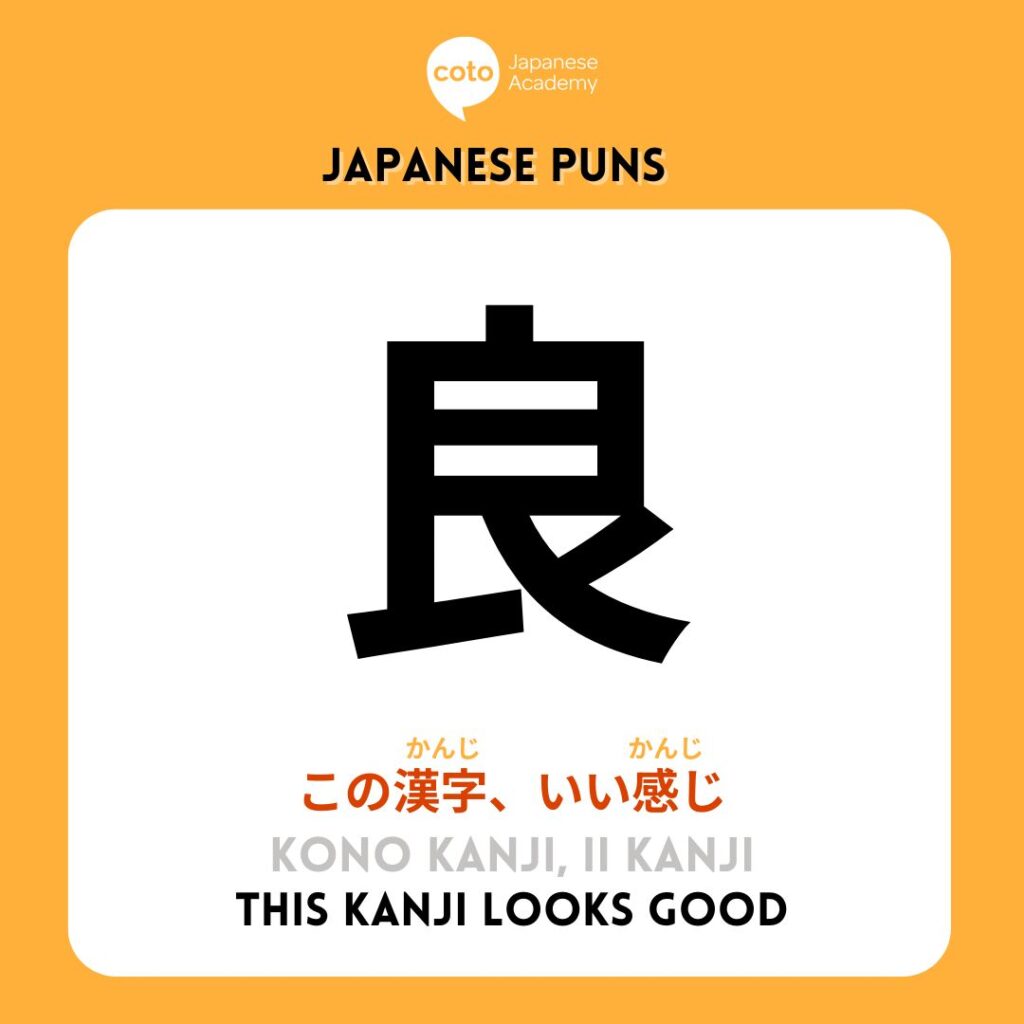
Romaji: Kono kanji, ii kanji
Meaning: This kanji, looks good.
Wordplay: Kanji (Japanese kanji) + kanji (feeling/looks)
Explanation: This pun relies on kanji (Chinese characters) and kanji (feeling). It is a meta-joke about the kanji looking aesthetically pleasing. The repetition makes it catchy and great for textbook humor or classroom jokes.
18. Dajare o itta no wa dajare? (ダジャレを言ったのは誰じゃ?)
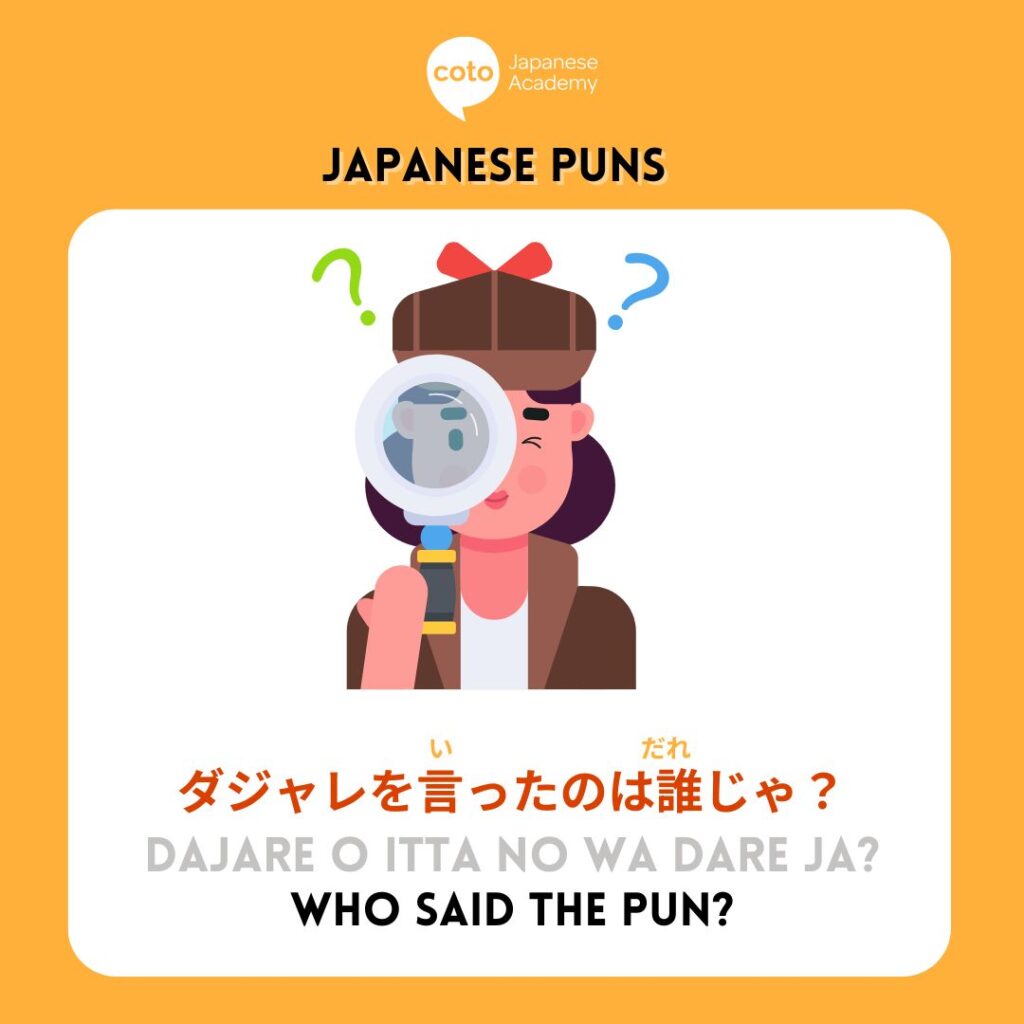
Romaji: Dajare o itta no wa dare ja?
Meaning: Who says the pun?
Wordplay: Dajare (pun) + dare ja (who?)
Explanation: Dajare means “pun” in Japanese, and dare ja means “who is it?” Said in an old-man or samurai-style accent, it becomes a silly accusation: “Who made the pun!?” It is often used after someone tells a bad joke, making it the perfect follow-up pun and a more lighthearted follow-up than silence.
20. Tako ni tako ga dekita (タコにたこができた)
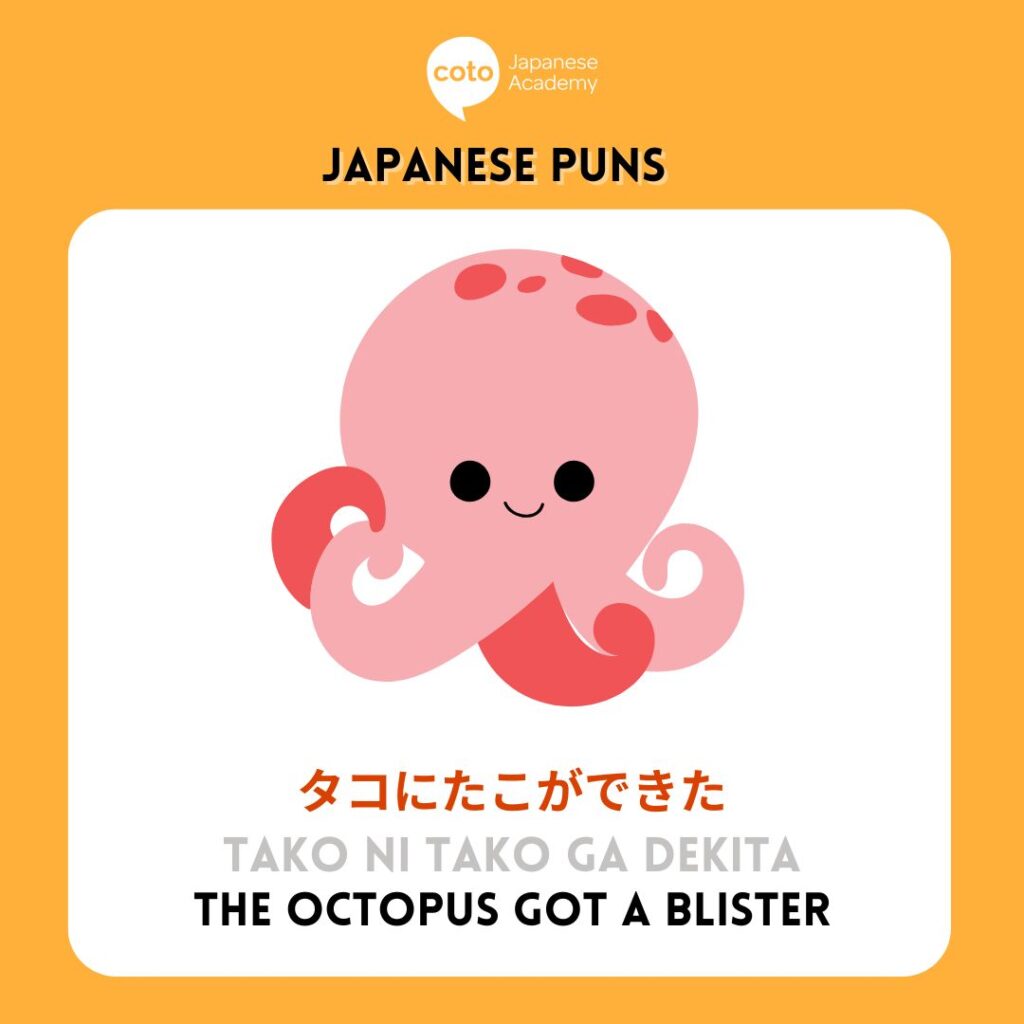
Romaji: Tako ni tako ga dekita
Meaning: The octopus got a blister.
Wordplay: Tako (octopus) + tako (blister)
Explanation: Tako means both “octopus” and “blister.” So this sentence sounds like “A blister formed on the octopus.” It is a cute and clever use of a double meaning that creates an unexpected and funny visual. It is especially beloved by elementary school students and pun enthusiasts alike.
Conclusion
Dajare, or Japanese puns, may be groan-worthy, but they are an iconic and creative part of Japanese humor. Whether it is a quick pun in daily conversations or a full-on gag in a TV skit, mastering these jokes adds a fun layer to your language learning.
Learn to Make Your Own Puns by Learning Japanese!
Want to impress your friends with clever Japanese wordplay? Learn more Japanese with Coto Academy! Our expert teachers don’t just teach you grammar and vocabulary — we help you dive into the fun side of Japanese culture! Whether you’re a beginner or advanced learner, our flexible courses give you the tools to understand, appreciate, and even create your own dajare.
Fill out our form below and get a free level check!
FAQ
What does dajare mean in Japanese?
Dajare is a pun or joke based solely on wordplay. There can be different types of dajare, but all are based on the concept of playing around with words and their different meanings.
Why are puns so common in Japan?
Japanese is full of homophones and similar-sounding words because of its limited set of syllables. This makes it easy to come up with puns. They are also a simple way to break the ice or make people smile.
What is the difference between a dajare and a joke?
A dajare is a specific type of joke that hinges entirely on wordplay, usually a pun based on sound similarities. Regular jokes might involve storytelling, sarcasm, or situational humor.
Are Japanese puns used in anime or manga?
Absolutely, puns are a staple in anime and manga. Characters might crack puns during dialogue to lighten the mood, make others groan, or even help teach kids new vocabulary.
Start learning Japanese with Coto Academy
